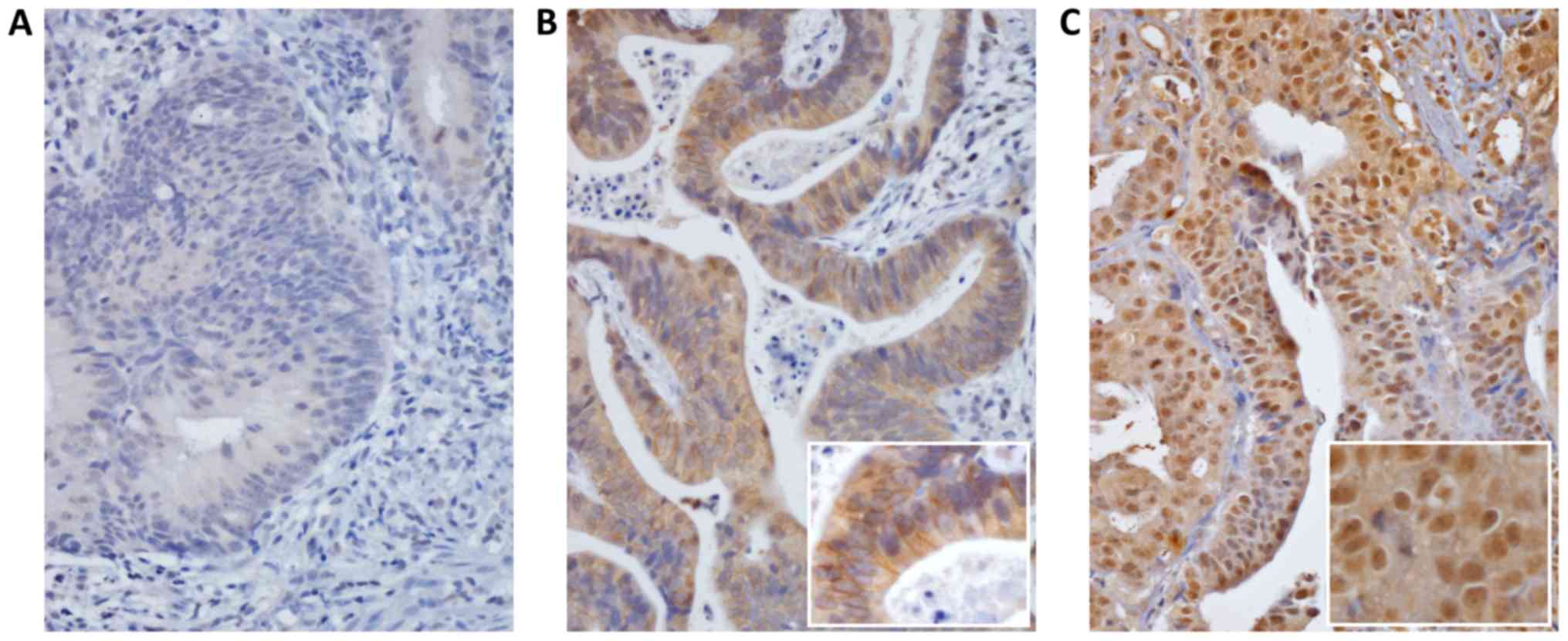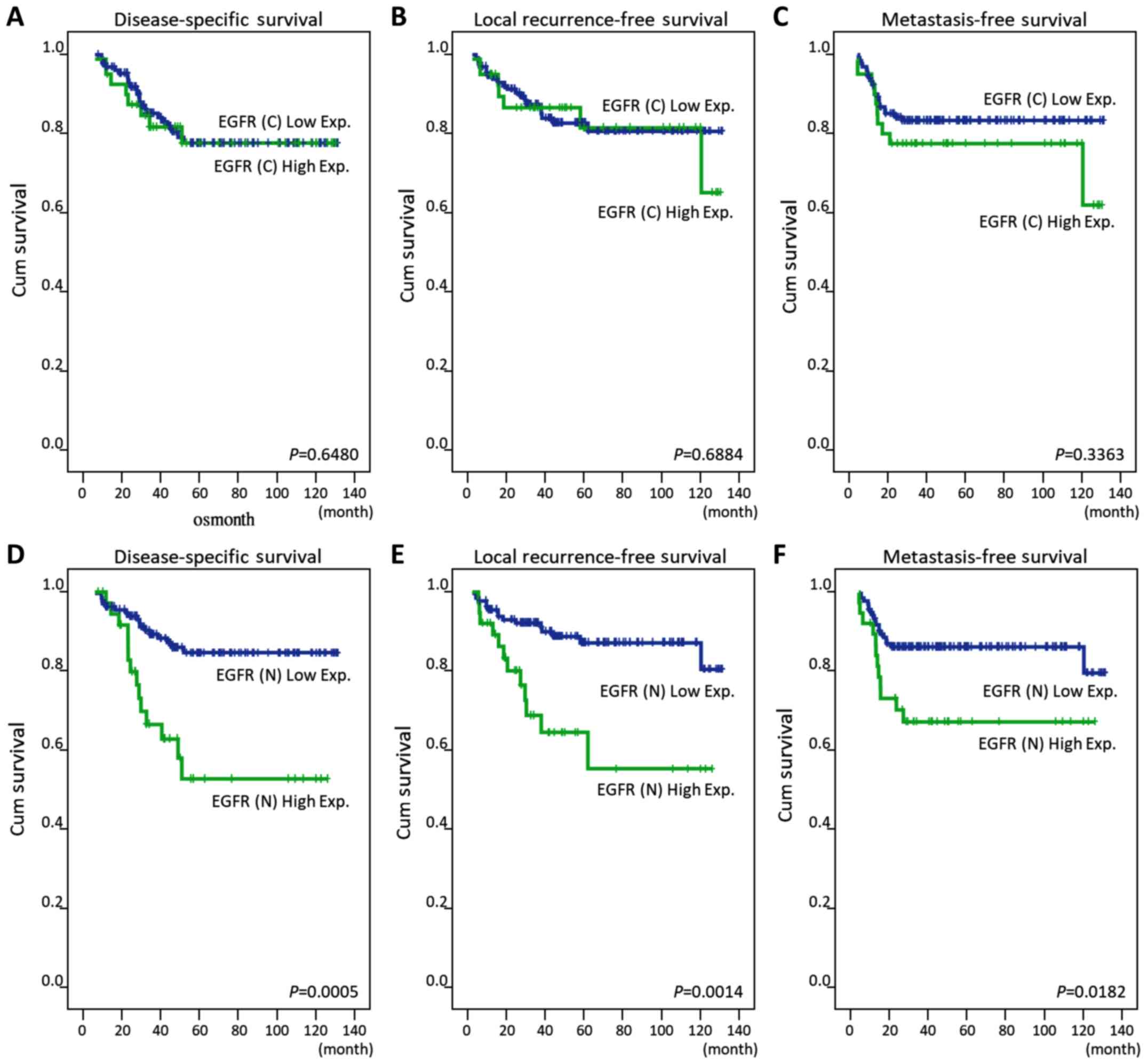|
1
|
Siegel RL, Miller KD and Jemal A: Cancer
statistics, 2016. CA Cancer J Clin. 66:7–30. 2016. View Article : Google Scholar : PubMed/NCBI
|
|
2
|
Sauer R, Becker H, Hohenberger W, Rödel C,
Wittekind C, Fietkau R, Martus P, Tschmelitsch J, Hager E, Hess CF,
et al: Preoperative versus postoperative chemoradiotherapy for
rectal cancer. N Engl J Med. 351:1731–1740. 2004. View Article : Google Scholar : PubMed/NCBI
|
|
3
|
van den Brink M, Stiggelbout AM, van den
Hout WB, Kievit J, Klein Kranenbarg E, Marijnen CA, Nagtegaal ID,
Rutten HJ, Wiggers T and van de Velde CJ: Clinical nature and
prognosis of locally recurrent rectal cancer after total mesorectal
excision with or without preoperative radiotherapy. J Clin Oncol.
22:3958–3964. 2004. View Article : Google Scholar : PubMed/NCBI
|
|
4
|
Yarden Y and Sliwkowski MX: Untangling the
ErbB signalling network. Nat Rev Mol Cell Biol. 2:127–137. 2001.
View Article : Google Scholar : PubMed/NCBI
|
|
5
|
Navolanic PM, Steelman LS and McCubrey JA:
EGFR family signaling and its association with breast cancer
development and resistance to chemotherapy (Review). Int J Oncol.
22:237–252. 2003.PubMed/NCBI
|
|
6
|
Zhang YL, Yuan JQ, Wang KF, Fu XH, Han XR,
Threapleton D, Yang ZY, Mao C and Tang JL: The prevalence of EGFR
mutation in patients with non-small cell lung cancer: A systematic
review and meta-analysis. Oncotarget. 7:78985–78993.
2016.PubMed/NCBI
|
|
7
|
Brand TM, Iida M, Luthar N, Starr MM,
Huppert EJ and Wheeler DL: Nuclear EGFR as a molecular target in
cancer. Radiother Oncol. 108:370–377. 2013. View Article : Google Scholar : PubMed/NCBI
|
|
8
|
Lo HW, Ali-Seyed M, Wu Y, Bartholomeusz G,
Hsu SC and Hung MC: Nuclear-cytoplasmic transport of EGFR involves
receptor endocytosis, importin beta1 and CRM1. J Cell Biochem.
98:1570–1583. 2006. View Article : Google Scholar : PubMed/NCBI
|
|
9
|
Traynor AM, Weigel TL, Oettel KR, Yang DT,
Zhang C, Kim K, Salgia R, Iida M, Brand TM, Hoang T, et al: Nuclear
EGFR protein expression predicts poor survival in early stage
non-small cell lung cancer. Lung Cancer. 81:138–141. 2013.
View Article : Google Scholar : PubMed/NCBI
|
|
10
|
Hadzisejdić I, Mustać E, Jonjić N,
Petković M and Grahovac B: Nuclear EGFR in ductal invasive breast
cancer: Correlation with cyclin-D1 and prognosis. Mod Pathol.
23:392–403. 2010. View Article : Google Scholar : PubMed/NCBI
|
|
11
|
Yoo PS, Sullivan CA, Kiang S, Gao W, Uchio
EM, Chung GG and Cha CH: Tissue microarray analysis of 560 patients
with colorectal adenocarcinoma: High expression of HuR predicts
poor survival. Ann Surg Oncol. 16:200–207. 2009. View Article : Google Scholar : PubMed/NCBI
|
|
12
|
Richter I, Dvořák J, Urbanec M, Bluml A,
Čermáková E, Bartoš J and Petera J: The prognostic significance of
tumor epidermal growth factor receptor (EGFR) expression change
after neoadjuvant chemoradiation in patients with rectal
adenocarcinoma. Contemp Oncol (Pozn). 19:48–53. 2015.PubMed/NCBI
|
|
13
|
Li CF, Fang FM, Wang JM, Tzeng CC, Tai HC,
Wei YC, Li SH, Lee YT, Wang YH, Yu SC, et al: EGFR nuclear import
in gallbladder carcinoma: Nuclear phosphorylated EGFR upregulates
iNOS expression and confers independent prognostic impact. Ann Surg
Oncol. 19:443–454. 2012. View Article : Google Scholar : PubMed/NCBI
|
|
14
|
Molinari C, Matteucci F, Caroli P and
Passardi A: Biomarkers and molecular imaging as predictors of
response to neoadjuvant chemoradiotherapy in patients with locally
advanced rectal cancer. Clin Colorectal Cancer. 14:227–238. 2015.
View Article : Google Scholar : PubMed/NCBI
|
|
15
|
Smith FM, Reynolds JV, Miller N, Stephens
RB and Kennedy MJ: Pathological and molecular predictors of the
response of rectal cancer to neoadjuvant radiochemotherapy. Eur J
Surg Oncol. 32:55–64. 2006. View Article : Google Scholar : PubMed/NCBI
|
|
16
|
Doger FK, Meteoglu I, Tuncyurek P, Okyay P
and Cevikel H: Does the EGFR and VEGF expression predict the
prognosis in colon cancer? Eur Surg Res. 38:540–544. 2006.
View Article : Google Scholar : PubMed/NCBI
|
|
17
|
Rego RL, Foster NR, Smyrk TC, Le M,
O'Connell MJ, Sargent DJ, Windschitl H and Sinicrope FA: Prognostic
effect of activated EGFR expression in human colon carcinomas:
Comparison with EGFR status. Br J Cancer. 102:165–172. 2010.
View Article : Google Scholar : PubMed/NCBI
|
|
18
|
Garouniatis A, Zizi-Sermpetzoglou A, Rizos
S, Kostakis A, Nikiteas N and Papavassiliou AG: FAK, CD44v6, c-Met
and EGFR in colorectal cancer parameters: Tumour progression,
metastasis, patient survival and receptor crosstalk. Int J
Colorectal Dis. 28:9–18. 2013. View Article : Google Scholar : PubMed/NCBI
|
|
19
|
Spano JP, Lagorce C, Atlan D, Milano G,
Domont J, Benamouzig R, Attar A, Benichou J, Martin A, Morere JF,
et al: Impact of EGFR expression on colorectal cancer patient
prognosis and survival. Ann Oncol. 16:102–108. 2005. View Article : Google Scholar : PubMed/NCBI
|
|
20
|
Wang YN, Wang H, Yamaguchi H, Lee HJ, Lee
HH and Hung MC: COPI-mediated retrograde trafficking from the Golgi
to the ER regulates EGFR nuclear transport. Biochem Biophys Res
Commun. 399:498–504. 2010. View Article : Google Scholar : PubMed/NCBI
|
|
21
|
Lin SY, Makino K, Xia W, Matin A, Wen Y,
Kwong KY, Bourguignon L and Hung MC: Nuclear localization of EGF
receptor and its potential new role as a transcription factor. Nat
Cell Biol. 3:802–808. 2001. View Article : Google Scholar : PubMed/NCBI
|
|
22
|
Lo HW, Hsu SC, Ali-Seyed M, Gunduz M, Xia
W, Wei Y, Bartholomeusz G, Shih JY and Hung MC: Nuclear interaction
of EGFR and STAT3 in the activation of the iNOS/NO pathway. Cancer
Cell. 7:575–589. 2005. View Article : Google Scholar : PubMed/NCBI
|
|
23
|
Wang SC, Nakajima Y, Yu YL, Xia W, Chen
CT, Yang CC, McIntush EW, Li LY, Hawke DH, Kobayashi R and Hung MC:
Tyrosine phosphorylation controls PCNA function through protein
stability. Nat Cell Biol. 8:1359–1368. 2006. View Article : Google Scholar : PubMed/NCBI
|
|
24
|
Dittmann K, Mayer C, Fehrenbacher B,
Schaller M, Raju U, Milas L, Chen DJ, Kehlbach R and Rodemann HP:
Radiation-induced epidermal growth factor receptor nuclear import
is linked to activation of DNA-dependent protein kinase. J Biol
Chem. 280:31182–31189. 2005. View Article : Google Scholar : PubMed/NCBI
|
|
25
|
Hoshino M, Fukui H, Ono Y, Sekikawa A,
Ichikawa K, Tomita S, Imai Y, Imura J, Hiraishi H and Fujimori T:
Nuclear expression of phosphorylated EGFR is associated with poor
prognosis of patients with esophageal squamous cell carcinoma.
Pathobiology. 74:15–21. 2007. View Article : Google Scholar : PubMed/NCBI
|
|
26
|
Hsu SC, Miller SA, Wang Y and Hung MC:
Nuclear EGFR is required for cisplatin resistance and DNA repair.
Am J Transl Res. 1:249–258. 2009.PubMed/NCBI
|
















